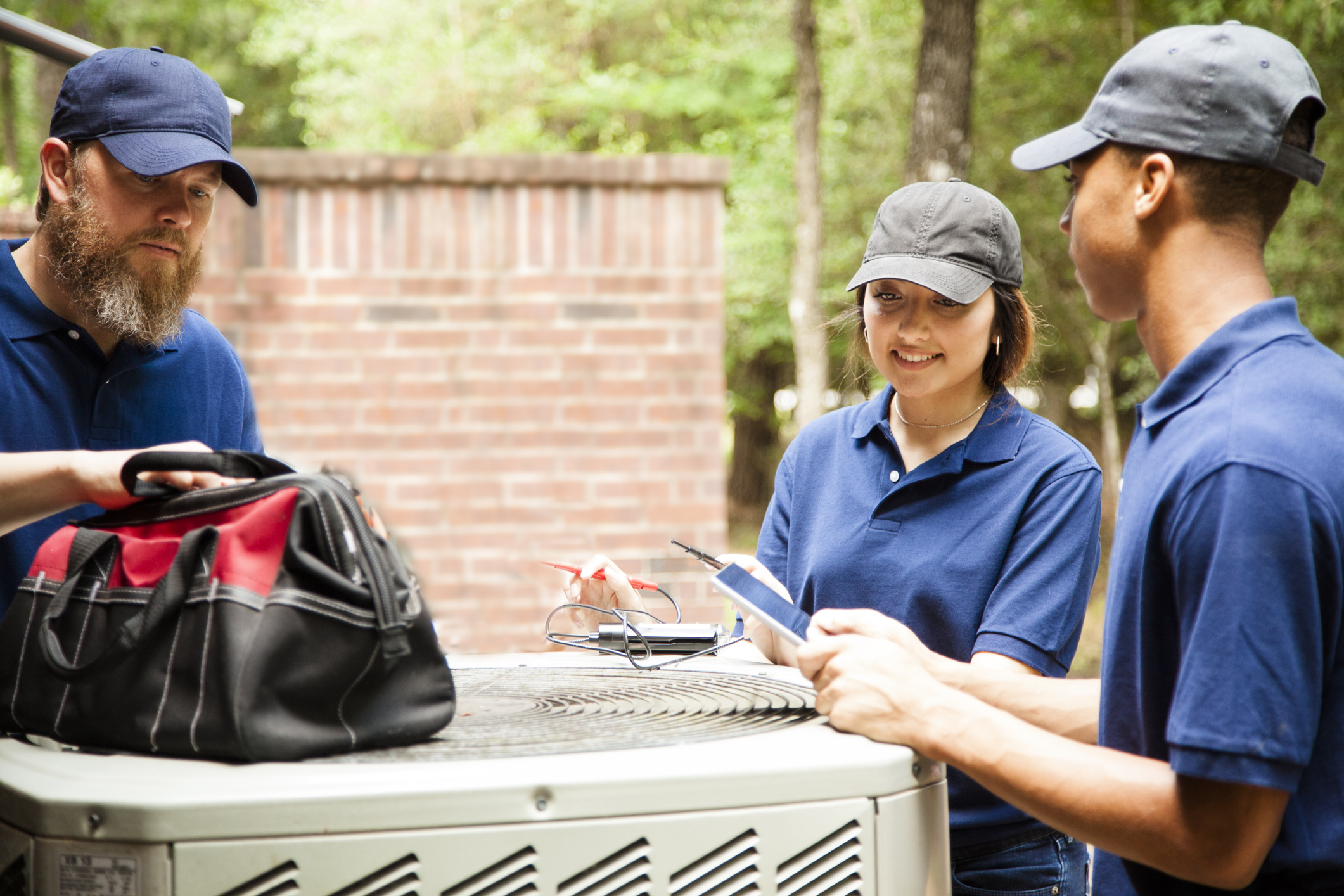Are you interested in becoming an HVAC technician? HVAC technicians are in demand. As an HVAC technician, you can help maintain comfortable climates in homes and businesses, as well as ensure safe food production and storage. If there’s anything that must be heated, cooled, or refrigerated, then you can make it happen.
What Does an HVAC Technician Do?
HVAC/R stands for heating, air conditioning, ventilation, and refrigeration. According to the U.S. Bureau of Labor Statistics, HVAC/R technicians install, maintain, and repair HVAC systems that control the temperature, humidity, and overall air quality in homes and businesses. They also help service and maintain these HVAC systems to ensure they are performing at peak efficiency. HVAC technicians typically do the following:
- Install, fix, diagnose, clean, and maintain HVACR systems
- Install and repair electrical components and wiring
- Inspect, troubleshoot and test HVACR systems and components
- Educate customers on system malfunctions
- Order, repair and replace worn or defective parts
- Recommend maintenance to customers for improved system performance
- Manage records of work performed for future appointments
How Do You Become an HVAC Technician?
As technology advances, HVAC systems are becoming increasingly complex and sophisticated. As such, most employers look for HVAC/R technicians to possess a certificate from an accredited HVAC/R technical school. Plus, to become a journeyman HVAC technician in Texas, you must hold a license from the Texas Department of Licensing & Regulation. The path to licensing starts with the completion of an HVAC technician program. HVAC technicians can start as apprentices and move up to journeyman to work independently without supervision.
Step #1: Complete Trade School
For most HVAC technicians, the journey starts at a trade school that offers programs in heating, air conditioning, ventilation, and refrigeration. In Austin and Killeen, this trade school is CyberTex.
Step #2: Complete Apprenticeship
Next, HVAC technicians will obtain an apprenticeship with a licensed HVAC technician for further their technical school training. As an HVAC technician, you will perform basic tasks under strict supervision. As you get better, you will start to learn more about complex duties like testing motors, diagnosing system failures, and using special tools like electronic meters. This step often takes 3 years to fully complete.
Step #3: Obtain EPA 608 Certification
Finally, you will need to obtain the necessary licenses, certifications, and registrations. For instance, the U.S. Environmental Protection Agency (EPA) must ascertain that you can safely handle or work with a refrigerant. This is done by passing a special exam, which then qualifies you for the Clean Air Act Section 608 Technician Certification.
Obtain Industry Certifications
You can also apply for additional industry competence certifications such as the North American Technician Excellence (NATE), which indicates specialty in areas like heat pumps, boilers, and air conditioning, or the Refrigerating Engineers and Technicians Association (RETA) if you want to focus on industrial refrigeration. These additional credentials give you the opportunity to increase your earning potential and qualify for promotions.
How Fast Can You Learn HVAC?
Did you know that you can become an HVAC technician in as little as 11 months? Are you interested in becoming an HVAC technician but not sure how long you can stay out of the workforce? The good news is that CyberTex offers flexible class schedules. This means you can learn HVAC on your own time, while working around your busy schedule.
You learn a comprehensive curriculum and get plenty of hands-on training to prepare for an apprenticeship in HVAC. There are many benefits to attending CyberTex.
What are the Benefits of Attending CyberTex?
There are many benefits to attending CyberTex. They include:
A Quick Start
Apprenticeships can take up to 4 years to complete. Starting with a formal education at CyberTex will give you a jump start to your career and help you prepare for the industry within 11 months. This formal education also qualifies as work experience when it is time to apply for your HVAC license. Instead of jumping headfirst into an apprenticeship and slowly learning about HVAC, focus your first year of learning at CyberTex and enjoy a complete curriculum and hands-on training in real HVAC scenarios. This way you can build your confidence before working on real customer’s HVAC systems.
A Complete Curriculum
Apprenticeship is a must because it gives you hands-on experience and is a requirement for HVAC licensure. However, it may be limited to only tasks that the professional deems suitable for you to do. Formal education gives you an in-depth understanding of heating, air conditioning, ventilation, and refrigeration. This allows you to progress faster as an HVAC technician and handle anything that may come your way during your apprenticeship. Instead of being a master at one or two aspects of HVAC, you can be a jack-of-all-trades.
Career Services
Another benefit of attending formal education is the exposure to career services that can help you find your first apprenticeship after graduation. Career services includes job placement assistance, networking opportunities with industry professionals, and other resources to ensure successful career outcomes. Plus, we have close ties with the community and can find the opportunity that fits your passion.
Final Thought
Overall, becoming an HVAC technician is a great career choice because it offers stability and growth potential. With dedication, determination, and effort, you can join this field and make a successful career in the HVAC industry.
HVAC Technician Diploma
Ready to start a rewarding career as an HVAC technician in Texas? With more than two decades of success in the medical, health, and IT sectors, we added an HVAC course to our curriculum. We are proud to announce that we have flexible day and evening classes for the HVAC program.
CyberTex’s HVAC program can be completed in as little as 11-month attending full-time with the flexibility of day and evening classes. You will be eligible to take the EPA – 608 certification from the US Environmental Protection Agency with our training.
Want to learn more? Contact us today.





